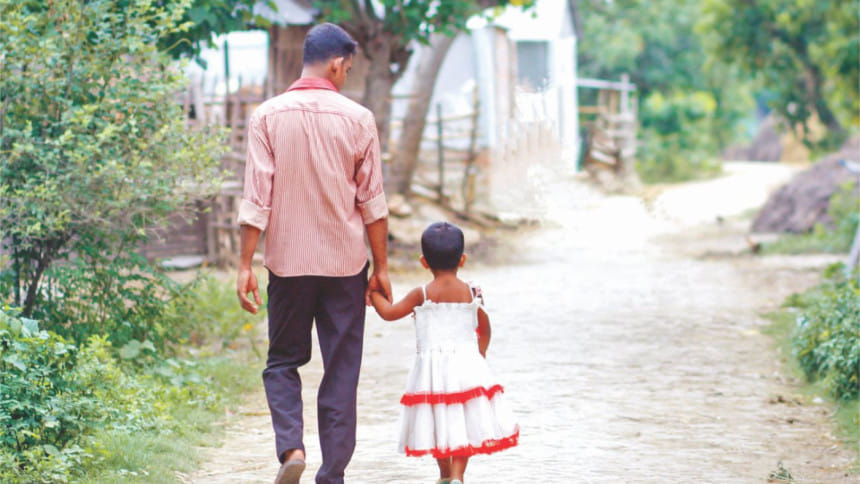Why aren't more men involved in child-rearing?

For centuries now, the bulk of childcare has been resting on the somewhat “weak” shoulders of women. And while statistics differ contextually, worldwide, an estimated 66 percent of caregivers are female—mostly catering to the elderly, ailing as well as children. Motherhood is synonymous with child bearer, caregiver, nurturer, teacher and home provider. Come to think of it, Goddess Durga with her many hands is the true personification of motherhood—multi-faceted, multi-tasking, and always at one's disposal. After all, that's what we have grown up seeing and believing of our own mothers. This phenomenon is optimally true in the Bangladeshi family structure, where men continue to be the decision-makers, the ones going out to earn a living, while mothers remain the centre of the home, giving up their past lives, their education, and, in some instances, their self-worth to tend to the family. While the situations and with it the mind-sets have changed in a particular segment of society (in which cases they are applauded for their “accomplishment”), it is safe to say that in most cases, men and child-rearing don't go hand in hand. Women are looked at as the epitome of success (or call it self-sacrifice) when they decide to give up their careers and get married, or consequently, have children, while men become role models in our society with the increase in zeroes in their salary.
Some countries have made more progress than others. Millions of dollars are being spent in countries like Germany to get more men enrolled in childcare roles professionally, yet it is interesting to note that even when it comes to paid childcare roles, the proportion of men is not more than two percent in most country settings. So why do men even in this day and age, shy away from taking care of their own children, and why is it seen as “a woman's work”, irrespective of whether she is a working woman or not?
First and foremost, the barrier is social. For far too long, childcare has been seen as a woman's duty, because the mother provides nourishment to the child during its early years, in the form of breast milk. More often than not, the fact that men can easily take up all other aspects of child-rearing—from putting the child to sleep, to washing, cleaning, etc.—is not even discussed. Men are also often considered to be “reckless” and incapable of tending to the needs of young ones. However, in an observational study carried out on male and female professional caregivers and their levels of sensitivity and stimulation toward three-year-old children, it was found that male and female caregivers showed the same levels of attention, sensitivity and stimulation toward boys and girls. Combined with other factors, the study led to the finding that male and female staff in childcare share similar interaction styles and gender roles—thus, breaking the stereotypical notion that men equate to insensitivity.
Another overwhelming fact remains that while many women these days are working along with looking after children, the burden of paying rents, bills, and basically, being the breadwinner of the family still, in most cases, falls on the man. As such, caregiving duties automatically fall on the woman. This does not in any way demean housework (studies actually indicate that housework should become paid work); on the contrary, because the house is shared by all the family members, housework needs to be equally distributed amongst everyone, irrespective of who is a working member or not. Similarly, both the mother and the father should share equal responsibility of the child, financially and otherwise. This discussion needs to take place prior to a couple having a child. Experts suggest writing and documenting decisions—such as who is responsible for what and by how much—in advance.
Bottom line, childcare at home or outside doesn't need to be a gendered phenomenon. If a woman can become a “stay-at-home mum” after having a child, so can a man. If a mum makes her family her priority, so can a dad. Similarly, if a dad is career-driven, the mum can be that too, and if a man is the financially viable one within a certain family, the woman can take on that role as well.
Whatever the case, raising a family needs to be done by both partners, together. Does this then make the so-called “maternal instinct” obsolete? I don't have an answer to this question, but what I do know is that a father who is sensitive, who looks after his family, and more importantly his child, is humane at best, and cannot or rather should not be considered as someone who is breaking taboos or be considered a superhero for these reasons alone.
Syeda Samara Mortada is a development practitioner and an advocate of equal rights.

 For all latest news, follow The Daily Star's Google News channel.
For all latest news, follow The Daily Star's Google News channel. 







Comments